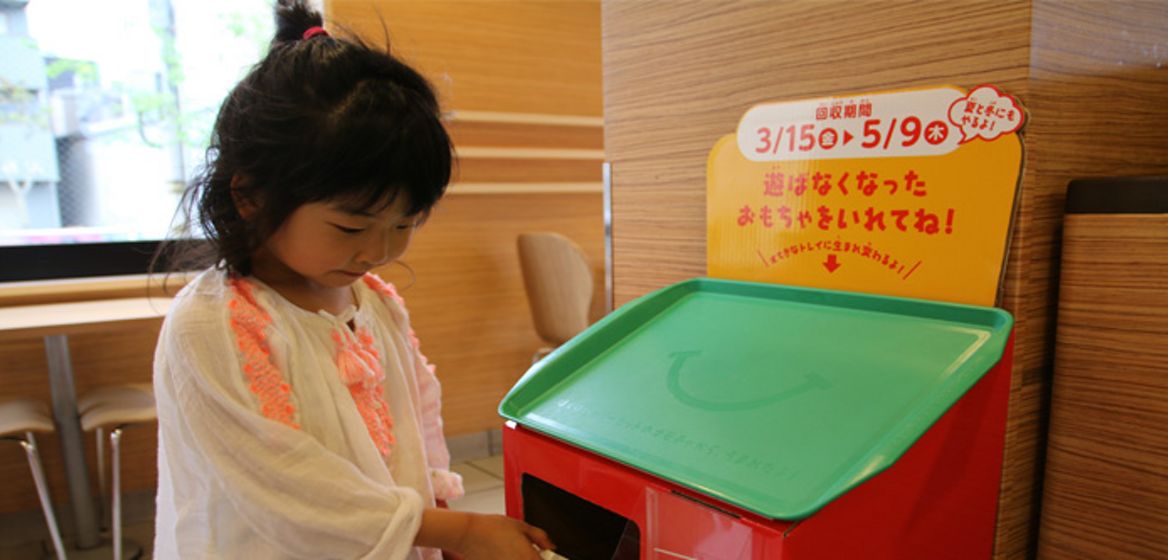These markets are sporting new, improved (and recycled) trays
August 26, 2019
Being more sustainable is all the rage – and McDonald’s is on board.
From trays made of marine plastic pellets that are “a sensation” in Norway to a widely publicized Happy Meal toy recycling program in Japan, McDonald’s markets around the world are finding ways to recover, recycle and transform used materials into new materials. This is part of our global strategy to achieve a circular economy, where we use fewer materials, and any we do use are reused or recycled. Here’s what they’re doing.
Small steps in Norway
McDonald’s Norway is producing serving trays made of marine plastic waste from the Nordland coast, in partnership with a small group that makes plastic pellets from marine waste collected by fishermen. The group creates products out of the marine plastic, like sunglasses, shoes and now, trays for McDonald’s restaurants.
“They’re nice and durable,” Kristina Johansen, a Communications Manager at McDonald’s Norway, says. “And they work.”
The plastic trays are made from 100% recycled marine waste and can be recycled again and again. Norway has 73 McDonald’s restaurants, and the marine plastic “green” trays can be found in a large number of them. When a restaurant needs new trays, it simply purchases the green ones.
“We don’t want them to throw away all the trays that they have,” Kristina explains. “Restaurants use their older trays until they need to recycle them.”
Customers and franchisees have been very positive about the marine plastic initiative.
“It’s important to show that we can create products that we need in a more environmental way,” Kristina says.
The marine plastic trays aren’t the only step Norway has taken to be more sustainable. The market has eliminated plastic straws from its restaurants, and salads and the McFlurry dessert now come in different packaging, as well.
“We’re doing small things one step at a time – but we will have made quite a big jump by the end,” Kristina says. “I think people notice that, and appreciate that that’s the way to go ahead.”
From toys to trays in Japan
Plastics are “very much in the spotlight” around the world – and in Japan, we decided to use the recycling of plastics as an educational moment.
Beginning last year, we developed a partnership with Japan’s Ministry of the Environment to launch the Happy Meal toy recycling program – one of the largest-scale efforts to date of plastic toy recycling in Japan. From February to May, there were toy recycling boxes in all 2,900 of our Japanese restaurants. The program benefitted parents, who were eager for an opportunity to get old plastic toys out of their house; kids, who learned all about the importance of recycling; and our brand, which enjoyed a fantastic PR boost.
The idea behind the recycling program was pretty simple, but the impact was huge. In total, we collected 1.27 million toys, which were “reborn” into 100,000 trays. And research shows 81% of mothers in Japan now believe McDonald’s Japan is concerned about the environment.
We also learned that 70% of moms in Japan would keep their kids’ Happy Meal toys and bring them to one of our restaurants if they knew when the next recycling program was taking place. Armed with that knowledge, we scheduled a second recycling program during the school holidays this year.
Meanwhile, Japan’s recycled trays made quite a splash on the world stage. During the 2019 G20 Summit in Japan in June, world leaders and journalists were able to eat meals on our recycled trays. The trays all had mats that clearly explained the Happy Meal toy recycling program in English, so leaders were able to learn more about the initiative and the positive impact McDonald’s is hoping to have on the environment.
It’s fair to say McDonald’s Japan has received very positive feedback from customers and the Japanese government, according to Jonathan Kushner, Vice President of Corporate Relations for McDonald’s Japan.
“Plastics are very much in the spotlight,” Jonathan says. “We’re proud that we’re able to bring kids, families and the environment together in this recycling initiative.”
Want to read more about McDonald’s work on Packaging & Recycling? Click here.

